

Search Products from 10 Million+
Range of ELISA Kits, Antibodies, Biochemicals, Recombinant Proteins & Assay Kits

BTL Biotechno Labs Pvt. Ltd. offers a comprehensive range of DNA technologies for custom antibody services. By integrating antibody gene sequencing, de novo antibody design, antibody humanization, antibody gene synthesis, recombinant antibody expression, monoclonal antibody preparation, and polyclonal antibody preparation, our technical platforms cover all stages of antibody discovery. Our motive is to provide support in the development of biobased medicines by offering high-quality research products and cost-effective solutions to the biotechnology, pharmaceutical, and academic communities.
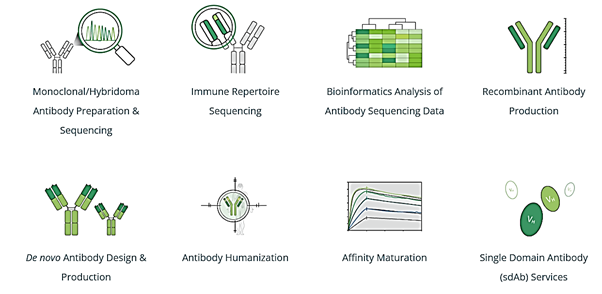
Monoclonal/Hybridoma Antibody Preparation & Sequencing
Clonal B cells and hybridoma cell lines are two examples of monoclonal antibody sequencing. After screening, both of these types of cells can produce a single antibody directed against a particular antigen. For accurate and effective hybridoma/clonal B cell sequencing services across a range of species, either Sanger or 5'RACE sequencing technologies are used. We offer a quick and simple method to sequence your hybridoma antibodies, assisting you in finding the most promising therapeutic leads for next-generation drug development.

Advantages
- Comprehensive: Full-length antibody sequences or the sequencing of heavy- and light-variable sections.
- Diverse applicability: Immunoglobulins from any species (mouse, rat, human, rabbit, hamster, camel, sheep, etc.) and a variety of antibody subtypes (IgG1, IgG2a, IgG2b, IgG3, IgG4, IgM, IgE, IgA, etc.) can be designed and sequenced using a professional immunogenetics database.
- Reliability: At least 4 positive clones are chosen for Sanger sequencing, and incorrect sequences are ruled out using sequence analysis.
- High-throughput and cost effective
- Fast turnaround time
- One-stop service solution from hybridoma sequencing to recombinant antibody production. For the non-human antibodies, antibody humanization service can also be considered.
Immune Repertoire Sequencing
The term "immune repertoire" refers to the total number of functionally diverse B cells and T cells that are present in an individual’s circulatory system at any given time. Targeting T/B cells, immune repertoire sequencing (Immuno-Seq) makes use of the 5' Rapid Amplification of cDNA Ends (RACE) Technology. Complementarity-determining regions (CDRs) of T cell receptors (TCRs) or B cell receptors (BCRs) are amplified by the 5' RACE technique. When used in conjunction with high-throughput sequencing technologies, Immuno-Seq offers a thorough analysis of the immune system diversity.
BTL Biotechno Labs Pvt. Ltd. provides a complete antibody repertoire sequencing system comprising immune repertoire sequencing, antibody CDR region sequencing, etc. The Immuno-Seq System is designed to help scientists observe and study T and B cells with unprecedented specificity. The immuno-Seq technique can be used for disease surveillance, antibody generation, vaccine research, health evaluation, and other related applications due to its specificity.
Advantages
- To reduce the amplification bias of the immunological repertoire genes, reliable RACE technology and particularly optimized PCR amplification equipment have been used
- High-throughput NGS analyses Optimal success rates and quick turnaround Comprehensive and cutting-edge bioinformatic analysis is intended to examine valuable data

Applications
- Analysing the immune/antibody repertoire diversity to examine health status
- Trace the evolution of antigen-specific antibodies and contribute to the research being conducted on humanized antibodies
- Evaluation of the vaccine effectiveness
Bioinformatics Analysis of Antibody Sequencing Data
High-quality sequencing of monoclonal antibodies from diverse species, including mice, rats, Armenian hamsters, camels, rabbits, equines, bovines, canines, birds, etc., can be performed via this platform. The Syno® Ab Platform is an effective computer-aided technology that can perform de novo sequencing analysis using antibodies from several antibody libraries, making the platform very applicable.
Advantages
- To ensure high success rates a custom primer sets are used.
- Redundancies can be eliminated and target antibody sequence information can be extracted using proprietary internal data mining technique.
- Diversified NGS analysis platform for antibody gene analysis produces high-quality output.
- Complete bioinformatics analysis eliminates unnecessary sequencing data and thoroughly combines the high-value data.

Recombinant Antibody Production
Any species or isotype's hybridoma sequence can be precisely obtained. A final recombinant antibody product will be delivered to support scientific research in a timely and cost-effective manner with high-throughput antibody manufacturing techniques.

Services:
- Hybridoma Sequencing
- Gene Synthesis
- Plasmid Preparation
- Cell Transfection & Culture
- Protein Purification
- Recombinant Antibody
De novo Antibody Design & Production
Antibody drugs are among the most promising therapies, have experienced massive growth as new drugs, and have been approved for use in treating numerous diseases. BTL Biotechno Labs Pvt. Ltd. offers a fast, reliable, flexible, and customised one-step solution to antibody discovery. The GenoAb platform includes hybridoma and monoclonal antibody sequencing, immune repertoire sequencing, and phage display. We have a platform for structure-based in silico antibody discovery that can screen early hits for antigens for wet-lab evaluation.
Service Flow Chart

Work Flow:
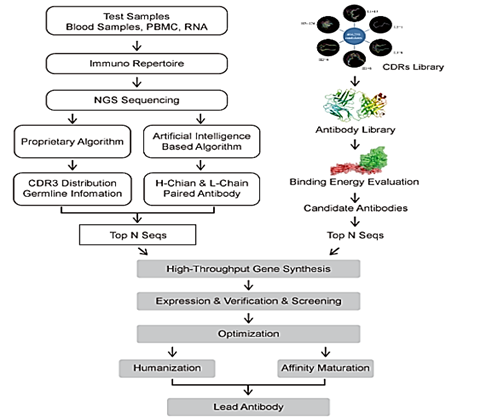
Applications
- Cloud computing
- Supercomputing
- High-throughput antibody modelling
- Effective antigen-antibody docking
- Antibodies humanization
- Affinity maturation
- Full human antibody library design
- CDR construction
Antibody Humanization
A platform for integrated antibody humanization and affinity maturation has been developed using cutting-edge phage and yeast display technology and sophisticated computer modelling and simulation methodologies. BTL Biotechno Labs Pvt. Ltd. offers in-silico CDR-grafting, computer-aided design and optimisation, high-throughput phage-display custom antibody products screening, and biacore surface resonance analysis as part of antibody humanization services. With this method, humanised antibodies with reduced immunogenicity can be produced that are as good as or better than parental antibodies in terms of specificity, bioactivity, thermostability, and productivity.
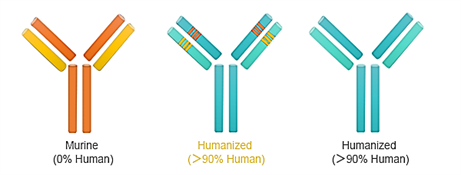
Featured Services:
- Chimeric antibody construction
- Antigen-antibody binding analysis
- Antibody model library construction
- Phage/Yeast display antibody library construction
- High-throughput antibody screening
- Humanized
Affinity Maturation
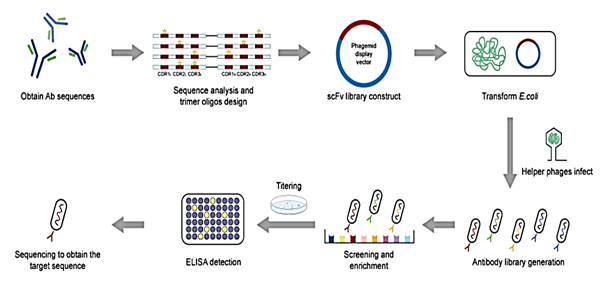
The binding affinity is one of the key factors in determining the effectiveness and dosage of an antibody drug. Currently, site mutation, CDR rearrangement, DNA recombinant, etc. are the main techniques used to increase the binding affinity of antibodies. We provide services for the identification of amino acid positions in the antibody domain with an efficient affinity maturation process. In turn, the antibody's binding affinity rises as a result, reaching at least nM levels.
Featured Applications:
- Immuno Sequencing
- DNA-Shuffling & Phage-Display Library Construction
- Phage-Display Screening
- Antibody Expression & Purification
- Antibody Characterization
- Full Report Prepration
Single Domain Antibody (sdAb) Services
Single-domain antibodies (sdAb), a new type of designed antibody fragments, are recombinant antibodies that are composed of a single monomeric variable antibody domain. sdAbs are more stable, more soluble, and smaller than traditional antibodies. Additionally, sdAb has simpler and more affordable production processes, higher permeability, decreased immunogenicity, and lower production costs.
Standard Process
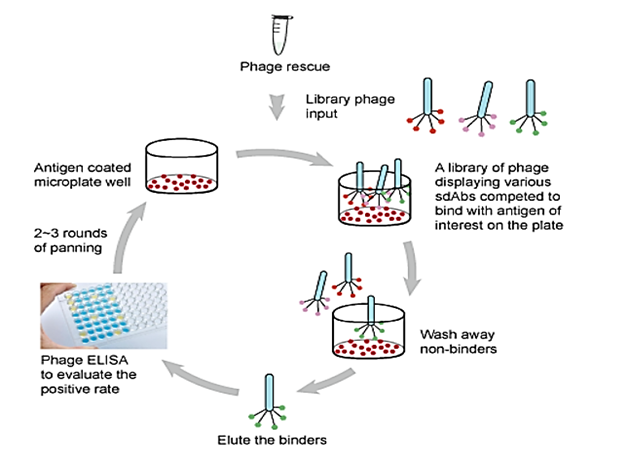
Featured Applications:
- Camel immunization (eg. dromedaries, camels, llamas, and alpacas)
- PBMC isolation & immune library construction
- Screening of phage-displayed library
- Functional assay for sdAb
- Large scale sdAb expression by yeast (followed by properties identification)


Subscribe to our newsletter
Drop your email address to get regular updates about discounts and offers
